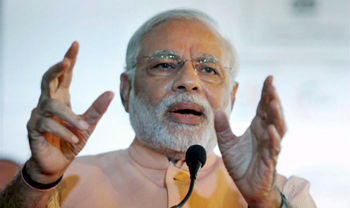New Delhi, Sept 13: Prime Minister Narendra Modi today expressed pain over the developments in Karnataka and Tamil Nadu over the Cauvery water dispute and appealed for peace while underlining that violence cannot provide solution to any problem.
 He asserted that the dispute can only be solved within the legal ambit and "breaking the law is not a viable alternative". "Situation that has emerged in Karnataka & Tamil Nadu, as a fallout of issue of distribution of waters of Cauvery River, is distressful.I am personally pained at the developments," he said in a statement.
He asserted that the dispute can only be solved within the legal ambit and "breaking the law is not a viable alternative". "Situation that has emerged in Karnataka & Tamil Nadu, as a fallout of issue of distribution of waters of Cauvery River, is distressful.I am personally pained at the developments," he said in a statement.
"Violence cannot provide a solution to any problem. In a democracy, solutions are found through restraint and mutual dialogue," he said. The Prime Minister appealed to the people of Karnataka and Tamil Nadu to display sensitivity.
"I appeal to the people of the two States, to display sensitivity, and also keep in mind their civic responsibilities," he said. The Prime Minister reposed faith in the people that they will keep "national interest" and "nation building above all else and give priority to restraint, harmony, and finding a solution, eschewing violence, destruction and arson."
One person was killed and another injured in police firing in Karnataka yesterday as the Cauvery water sharing row with Tamil Nadu turned violent, escalating tensions between the two states.
As Bangalore witnessed widespread violence bringing it on the edge, night curfew was imposed in 16 police station limits late last night". Modi said the violence and arson seen in the last two days is "only causing loss to the poor, and to our nation's property.
"Whenever the country has faced adverse circumstances, the people of Karnataka and Tamil Nadu, just like people across the country have always handled the situation with sensitivity," he noted.
The Supreme Court, modifying its September 5 order, had yesterday asked Karnataka to release a reduced amount of 12,000 cusecs of Cauvery River water to Tamil Nadu till September 20.
In its September five order, the apex court had directed release of 15,000 cusecs for 10 days to ameliorate the plight of farmers of the neighbouring state, which had triggered strong protests from farmers and pro-Kannada outfits with Karnataka observing a bandh against it on September nine.






Comments
Joker / Jumla man is back with his paid media.
Add new comment